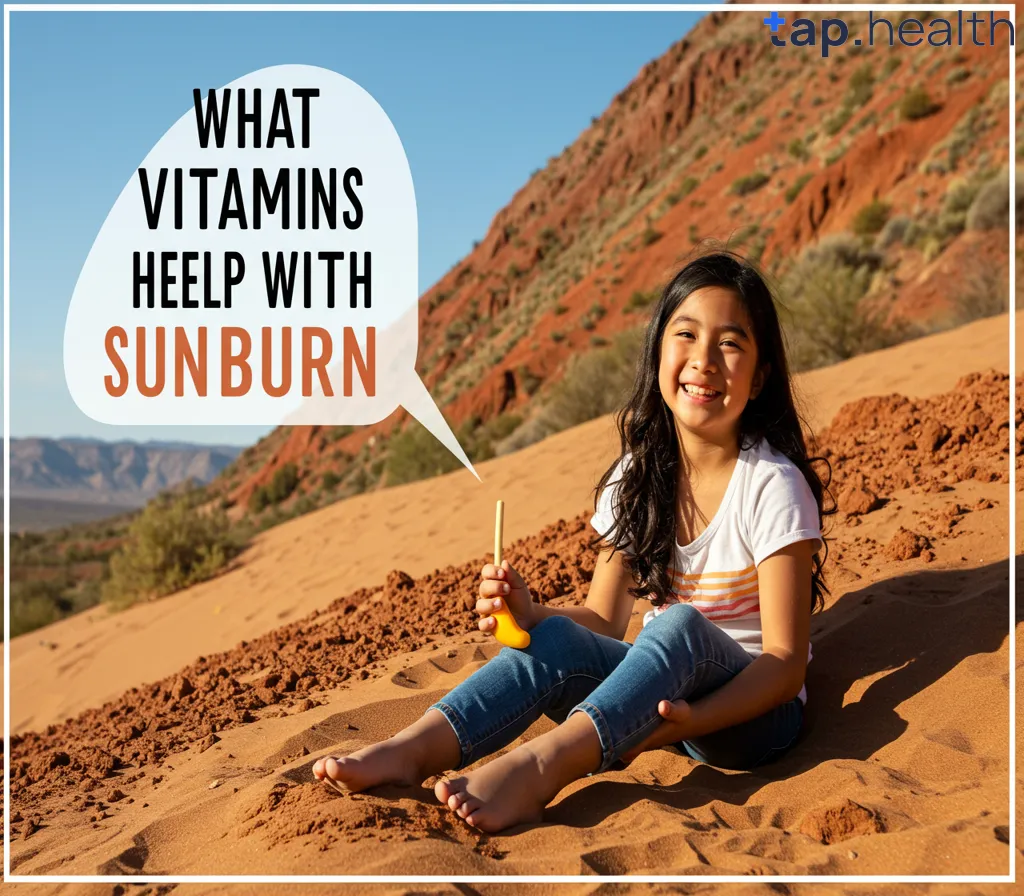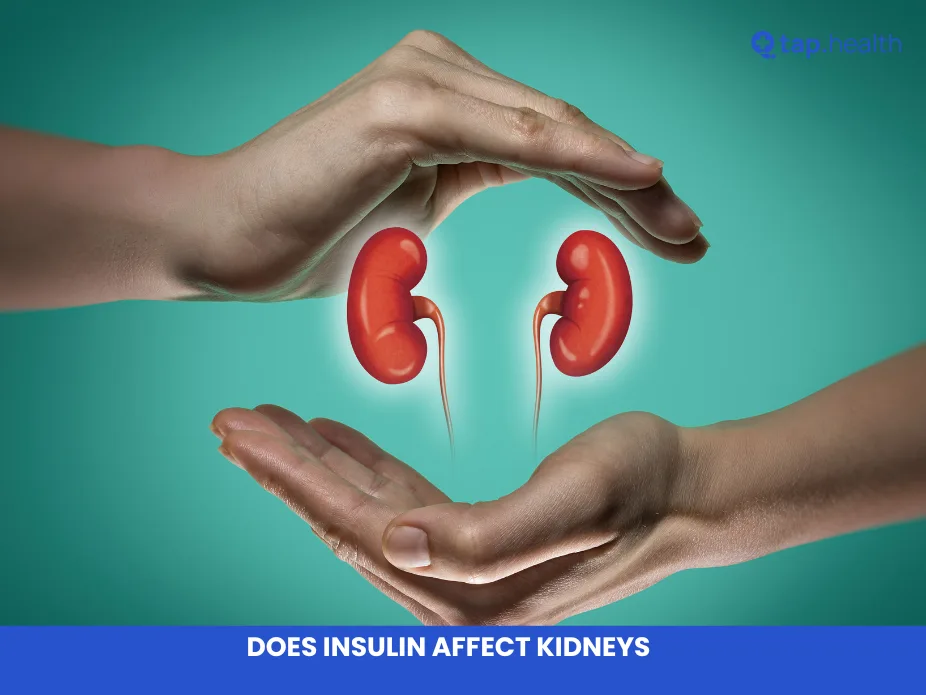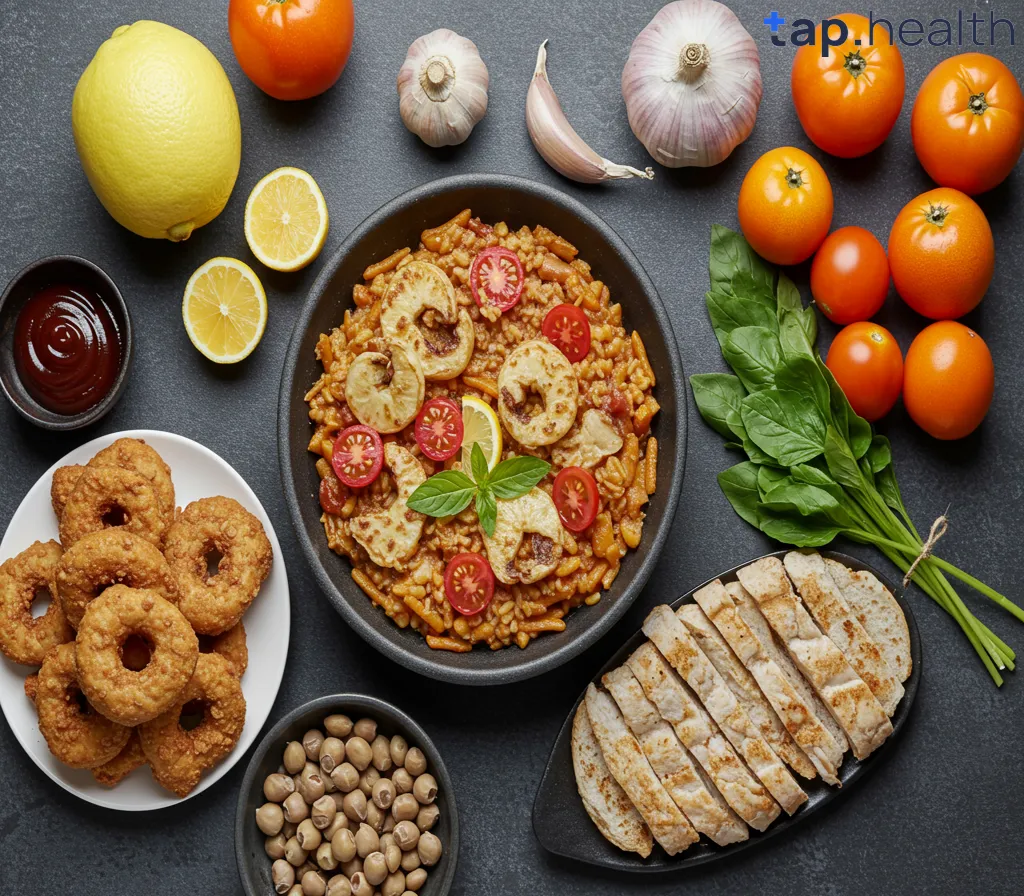Sunburn isn’t just painful—it’s a clear sign your skin has been damaged by the sun’s harmful ultraviolet (UV) rays. Whether it’s a mild pink glow or a painful, blistering burn, your body needs help to heal. While aloe vera and cool baths are go-to remedies, did you know certain vitamins can actually speed up recovery and protect your skin?
In this guide, we’ll answer the big question: what vitamins help with sunburn? We’ll break down the top vitamins and nutrients that support skin repair, reduce inflammation, and even help prevent future sun damage. You’ll learn how each vitamin works, where to find them, and why they matter—not just for healing, but for long-term skin health.
We’ll keep things simple and clear. No confusing science jargon. Just real, useful info you can trust and use—backed by research from top health sources like the National Institutes of Health (NIH), Mayo Clinic, and the American Academy of Dermatology.
Let’s dive in.
Why Your Skin Needs Vitamins After Sunburn
When your skin gets burned, it’s not just red and sore—it’s under serious stress. UV radiation damages skin cells, causes inflammation, and can even harm your DNA. Your body responds by sending healing signals, increasing blood flow, and starting repair mode.
But here’s the thing: your body can’t do this alone. It needs fuel. And that fuel comes in the form of vitamins and antioxidants.
Vitamins help in several ways:
- Reduce inflammation and redness
- Repair damaged skin cells
- Boost collagen production
- Prevent further damage
- Strengthen your skin’s natural defenses
Without enough of the right vitamins, healing takes longer, and your skin stays vulnerable. That’s why understanding what vitamins help with sunburn is so important—not just for recovery, but for protection.
Vitamin E: The Skin’s Natural Healer
Vitamin E is one of the most powerful allies your skin has. It’s a fat-soluble vitamin known for its strong antioxidant properties, meaning it fights off harmful molecules called free radicals that are produced when your skin is exposed to UV rays.
How Vitamin E Helps With Sunburn
When you get sunburned, your skin produces free radicals. These unstable molecules damage skin cells and speed up aging. Vitamin E steps in to neutralize them, reducing oxidative stress.
Studies show that vitamin E:
- Reduces redness and swelling
- Speeds up skin healing
- Prevents peeling and dryness
- Works better when combined with vitamin C
A 2020 review published in Nutrients found that topical vitamin E (applied to the skin) and oral intake both help protect against UV damage and support recovery.
How to Use Vitamin E for Sunburn
You can get vitamin E in two ways: through food and through topical products.
Topical Use:
- Apply vitamin E oil directly to sunburned areas (do a patch test first)
- Look for moisturizers or aloe gels that list vitamin E (tocopherol) in the ingredients
- Avoid using pure vitamin E on broken or blistered skin—it can irritate
Dietary Sources:
- Almonds and sunflower seeds
- Spinach and broccoli
- Avocados
- Sunflower oil and olive oil
- Fortified cereals
Recommended Daily Intake: Adults need about 15 mg (22.4 IU) of vitamin E per day.
💡 Tip: Don’t pop vitamin E capsules and apply them unless recommended by a doctor. Some people may have allergic reactions.
Vitamin C: The Repair Booster
If vitamin E is the protector, vitamin C is the repair crew. This water-soluble vitamin is essential for collagen production—a protein that keeps your skin firm and helps it heal.
Why Vitamin C Matters for Sunburn
After sun damage, your skin loses collagen. This can lead to sagging, fine lines, and slower healing. Vitamin C helps rebuild that collagen and also acts as a powerful antioxidant.
Key benefits of vitamin C for sunburn:
- Fights free radicals caused by UV exposure
- Reduces inflammation and redness
- Speeds up wound healing
- Brightens skin tone and reduces dark spots over time
A study from the Journal of Clinical and Aesthetic Dermatology shows that using vitamin C topically can reduce sunburn cells by up to 40% when applied before sun exposure.
But here’s the catch: your body can’t make vitamin C on its own. You have to get it from food or supplements.
How to Get More Vitamin C
Topical Use:
- Use serums or creams with L-ascorbic acid (the active form of vitamin C)
- Apply in the morning under sunscreen for added protection
- Avoid mixing with retinol or benzoyl peroxide unless your skin is used to it
Food Sources:
- Oranges, lemons, and grapefruits
- Strawberries and kiwi
- Bell peppers (especially red ones)
- Broccoli and Brussels sprouts
- Tomatoes
Daily Needs: Adults should get 75–90 mg per day. Smokers need more—about 35 mg extra—because smoking depletes vitamin C.
⚠️ Warning: Too much vitamin C (over 2,000 mg daily) can cause stomach upset or diarrhea. Stick to food sources unless advised otherwise by a doctor.
Vitamin D: The Sun’s Double-Edged Sword
You might be surprised to see vitamin D on a list about sunburn. After all, your body makes vitamin D when your skin is exposed to sunlight. But here’s the twist: too much sun gives you a burn, not more vitamin D.
Still, vitamin D plays a role in skin health and healing.
How Vitamin D Supports Skin Recovery
Vitamin D isn’t just for bones—it’s crucial for skin cell growth, repair, and metabolism. It helps regulate how skin cells develop and protects against infections.
After sunburn:
- Vitamin D helps control inflammation
- It supports the skin’s immune function
- It may reduce the risk of skin infections in damaged areas
However, you should never rely on sun exposure to get vitamin D after a burn. That would only make things worse.
How to Get Vitamin D Safely
The safest way to boost vitamin D is through diet and supplements.
Food Sources:
- Fatty fish (salmon, mackerel, tuna)
- Egg yolks
- Fortified milk and orange juice
- Mushrooms exposed to sunlight
Supplements: Many people are low in vitamin D, especially in winter. A daily supplement of 600–800 IU is common, but talk to your doctor before starting.
💡 Fun Fact: Some studies suggest that vitamin D may help reduce the risk of skin cancer—but more research is needed. Still, it’s a key player in overall skin health.
Vitamin A and Beta-Carotene: The Skin Protectors
Vitamin A is famous for healthy skin. It’s involved in cell growth, immune function, and vision. But when it comes to sunburn, its role is two-fold: prevention and repair.
How Vitamin A Helps Prevent and Heal Sunburn
Beta-carotene (a form of vitamin A found in plants) acts as a natural sunscreen. It builds up in the skin and helps absorb UV light, reducing the chance of sunburn over time.
Research shows that taking beta-carotene supplements for 10 weeks can reduce sun sensitivity, especially in people with fair skin.
Once you’re burned, vitamin A helps:
- Speed up skin cell turnover
- Reduce peeling and flaking
- Support the formation of new, healthy skin
Best Sources of Vitamin A
Animal Sources (Retinol):
- Liver (beef or chicken)
- Eggs
- Dairy products (milk, cheese, butter)
Plant Sources (Beta-Carotene):
- Carrots (the most famous source)
- Sweet potatoes
- Spinach and kale
- Butternut squash
- Red bell peppers
Daily Needs: Adults need about 700–900 mcg of vitamin A per day.
⚠️ Caution: Too much preformed vitamin A (from supplements or liver) can be toxic. Stick to food sources unless directed by a doctor.
B Vitamins: The Healing Helpers
B vitamins don’t get as much attention as A, C, or E, but they’re essential for skin repair. Specifically, B3 (niacinamide) and B5 (pantothenic acid) stand out for sunburn recovery.
Vitamin B3 (Niacinamide): The Inflammation Fighter
Niacinamide is a form of vitamin B3 that’s widely used in skincare. It helps reduce redness, strengthen the skin barrier, and prevent moisture loss.
For sunburn:
- Reduces swelling and discomfort
- Protects against UV damage when used regularly
- May lower the risk of skin cancer in high-risk people (per studies in The New England Journal of Medicine)
You can get B3 from:
- Chicken, turkey, and fish
- Peanuts and mushrooms
- Whole grains and fortified cereals
Topical niacinamide creams (5%) are also safe and effective for sensitive or sun-damaged skin.
Vitamin B5 (Pantothenic Acid): The Moisture Keeper
B5 helps your skin retain moisture and repair itself. It’s often found in healing ointments and moisturizers.
Benefits for sunburn:
- Soothes dry, peeling skin
- Speeds up wound healing
- Reduces itching and flaking
Foods rich in B5:
- Avocados
- Yogurt and milk
- Eggs
- Sweet potatoes
- Lentils and beans
While B vitamins are water-soluble (your body flushes out the extra), it’s still best to get them from food, not high-dose supplements, unless prescribed.
Antioxidants: Nature’s Sun Shields
Vitamins aren’t the only nutrients that help with sunburn. Antioxidants—natural compounds found in plants—play a huge role in protecting and healing your skin.
What Are Antioxidants?
Antioxidants are substances that protect your cells from damage caused by free radicals. UV rays create free radicals, which lead to inflammation, aging, and even skin cancer.
The best antioxidants for sunburn include:
- Vitamin C and E (already covered)
- Selenium
- Polyphenols (found in green tea and dark chocolate)
- Lycopene (found in tomatoes)
- Astaxanthin (from salmon and algae)
How Antioxidants Help After Sunburn
- Reduce redness and swelling
- Speed up healing time
- Improve skin texture
- Work best when combined with sunscreen
A 2017 study in Photodermatology, Photoimmunology & Photomedicine found that people who ate tomato paste (rich in lycopene) daily for 10 weeks had 40% fewer sunburn cells.
💡 Pro Tip: Eat a colorful diet. The more colors on your plate (red peppers, green spinach, orange carrots), the more antioxidants you’re getting.
Omega-3 Fatty Acids: The Anti-Inflammatory Power
You might not think of fish oil as a sunburn remedy, but omega-3 fatty acids are powerful anti-inflammatory agents.
How Omega-3s Help With Sunburn
Sunburn causes inflammation—your skin turns red, feels hot, and swells. Omega-3s help calm this response.
Benefits:
- Reduce skin redness and pain
- Support skin barrier function
- May protect against long-term sun damage
A study from The American Journal of Clinical Nutrition showed that people who took omega-3 supplements for 3 months had less UV-induced skin damage.
Best Sources of Omega-3s
- Fatty fish: salmon, mackerel, sardines
- Flaxseeds and chia seeds
- Walnuts
- Algal oil (a vegan source)
Daily Recommendation: Aim for at least two servings of fatty fish per week, or consider a supplement (1,000 mg EPA + DHA daily) if you don’t eat fish.
Zinc: The Healing Mineral
Zinc isn’t a vitamin, but it’s a mineral that’s essential for skin repair. It’s often used in diaper rash creams and cold sore treatments because it speeds up healing.
Why Zinc Matters for Sunburn
Zinc:
- Supports immune function in the skin
- Helps create new skin cells
- Reduces inflammation
- Acts as a mild antioxidant
Some sunscreens use zinc oxide as a physical barrier to block UV rays—proof of its skin-protecting power.
How to Use Zinc for Sunburn
Topical:
- Use zinc oxide creams or ointments on mild sunburn
- Safe for sensitive skin and kids
- Can help prevent infection in peeling areas
Oral:
- Found in pumpkin seeds, chickpeas, and shellfish
- Supplements (15–30 mg daily) may help healing, but don’t overdo it—too much zinc can cause nausea and lower copper levels
What NOT to Do After Sunburn
Even with the right vitamins, some habits can slow healing or make things worse.
Avoid These Common Mistakes
- Popping blisters: This increases infection risk. Let them heal naturally.
- Using harsh soaps or scrubs: They irritate damaged skin. Use gentle, fragrance-free cleansers.
- Peeling skin yourself: Let it flake off on its own.
- Skipping hydration: Sunburn pulls moisture from your skin. Drink extra water.
- Going back in the sun too soon: Your skin is extra sensitive. Stay in the shade and wear protective clothing.
Can Vitamins Prevent Sunburn?
You might be wondering: Can taking vitamins stop me from getting sunburned in the first place?
The short answer: not completely—but they can help.
No vitamin replaces sunscreen. But certain nutrients can boost your skin’s natural defenses and reduce the severity of sunburn over time.
Nutrients That May Help Prevent Sunburn
| Beta-carotene | Builds up in skin, absorbs UV light | Carrots, sweet potatoes |
| Vitamin C & E | Reduce oxidative stress | Oranges, almonds, spinach |
| Omega-3s | Lower inflammation response | Salmon, flaxseeds |
| Polypodium leucotomos (fern extract) | A plant supplement shown to reduce sun sensitivity | Available as a supplement |
⚠️ Important: These are not replacements for sunscreen, hats, or shade. Think of them as backup support.
How Long Does Sunburn Take to Heal?
Healing time depends on how bad the burn is.
Mild Sunburn (First-Degree)
- Symptoms: Red, warm, tender skin
- Healing Time: 3–5 days
- What Helps: Cool compresses, aloe, hydration, vitamins C and E
Moderate Sunburn (Second-Degree)
- Symptoms: Blistering, swelling, pain
- Healing Time: 1–2 weeks
- What Helps: Medical care if severe, zinc, omega-3s, avoid popping blisters
Severe Sunburn (Medical Emergency)
- Symptoms: Large blisters, fever, chills, nausea
- Healing Time: Several weeks
- What Helps: See a doctor. May need antibiotics or steroid creams.
💡 Note: Peeling usually starts 3–8 days after the burn. This is your body’s way of getting rid of damaged cells.
Top 5 Foods to Eat After Sunburn
Want faster healing? Focus on your diet. Here are the top 5 foods to eat when you’re sunburned:
1. Watermelon
- 92% water—great for hydration
- Contains lycopene and vitamin C
- Helps cool the body from the inside
2. Salmon
- Rich in omega-3s and vitamin D
- Reduces inflammation
- Supports skin repair
3. Oranges
- Packed with vitamin C
- Boosts collagen
- Refreshing and hydrating
4. Spinach
- High in vitamins A, C, and E
- Full of antioxidants
- Easy to add to smoothies or salads
5. Almonds
- Loaded with vitamin E
- Healthy fats support skin barrier
- Great as a snack or in nut butter
💡 Bonus Tip: Drink herbal teas like chamomile or green tea. They’re soothing and full of antioxidants.
Can Supplements Replace Sunscreen?
Absolutely not.
This is a big myth. Some people think that if they take “sun protection” supplements, they don’t need sunscreen. That’s dangerous.
Why Sunscreen Is Still Essential
- Blocks 95–99% of UVB rays (the ones that cause burns)
- Prevents DNA damage in skin cells
- Reduces risk of skin cancer
- Works immediately
Supplements and vitamins work over time and offer partial protection. They should be used alongside sunscreen, not instead of it.
Best Sunscreen Habits
- Use SPF 30 or higher
- Apply 15 minutes before going out
- Reapply every 2 hours (or after swimming/sweating)
- Use broad-spectrum (protects against UVA and UVB)
When to See a Doctor for Sunburn
Most sunburns can be treated at home. But some cases need medical attention.
Seek Help If You Have:
- Fever or chills
- Nausea or vomiting
- Large blisters covering a big area
- Signs of infection (pus, increasing pain, red streaks)
- Dizziness or confusion
- Sunburn in an infant under 1 year old
Severe sunburn can lead to dehydration or heatstroke. Don’t ignore it.
Can Vitamins Help With Sunburn Scarring?
Sometimes, sunburn can leave behind dark spots or uneven skin tone, especially in people with darker skin. This is called post-inflammatory hyperpigmentation.
Vitamins That Help Prevent or Fade Scarring
- Vitamin C: Brightens skin and blocks melanin overproduction
- Vitamin E: May help with scar texture (evidence is mixed)
- Niacinamide (B3): Reduces dark spots and improves skin tone
- Alpha arbutin and licorice root extract: Not vitamins, but often paired with them in skincare
💡 Tip: Always use sunscreen on healing skin to prevent dark spots from getting worse.
Myths About Vitamins and Sunburn – Busted!
Let’s clear up some common myths.
Myth 1: “Eating carrots lets me stay in the sun longer.”
False. Carrots have beta-carotene, which may offer minor protection over weeks, but it won’t stop sunburn. You still need sunscreen.
Myth 2: “Vitamin E oil cures sunburn overnight.”
Not true. It helps moisturize and heal, but it’s not a miracle cure. Healing takes days.
Myth 3: “If I take vitamin D, I don’t need to worry about sun damage.”
Wrong. Vitamin D is important, but sunburn damages your skin regardless. Get vitamin D safely—through food or supplements.
Myth 4: “Only fair-skinned people need to worry.”
False. All skin types can get sunburned and develop skin cancer. People with darker skin often get diagnosed later because they assume they’re immune.
Daily Habits to Protect Your Skin Long-Term
Prevention is always better than cure. Here’s how to keep your skin healthy year-round.
1. Eat a Skin-Protective Diet
- Focus on colorful fruits and veggies
- Include healthy fats (avocados, nuts, fish)
- Drink plenty of water
2. Take a Multivitamin (If Needed)
- If your diet lacks variety, a basic multivitamin can help fill gaps
- Look for one with vitamins A, C, E, B-complex, and zinc
3. Use Topical Antioxidants
- Apply vitamin C serum in the morning
- Use moisturizers with niacinamide or vitamin E
4. Wear Sunscreen Every Day
- Even on cloudy days
- On face, neck, ears, and hands
5. Replenish After Sun Exposure
- Drink water
- Eat antioxidant-rich foods
- Apply soothing lotions
FAQ: What Vitamins Help With Sunburn?
What is the fastest way to heal sunburn?
The fastest way includes cooling the skin (with aloe or cool compresses), staying hydrated, and supporting healing with vitamins C, E, and B3. Avoid further sun exposure.
Can vitamin C help with sunburn?
Yes. Vitamin C reduces inflammation, fights free radicals, and boosts collagen. Use it in your diet or as a topical serum.
Is vitamin E good for sunburn?
Yes. Vitamin E is a powerful antioxidant that helps repair skin and reduce peeling. Use it in moisturizers or get it from foods like almonds and spinach.
Can I take supplements for sunburn?
Yes, but focus on food first. Supplements like vitamin C, E, omega-3s, and niacinamide can help, but don’t replace proper sun protection.
Does vitamin D help with sunburn?
Not directly. Vitamin D is important for skin health, but you shouldn’t get it from sun exposure after a burn. Get it from food or supplements instead.
What foods help repair sunburned skin?
Foods rich in antioxidants and healthy fats help—like watermelon, salmon, oranges, spinach, and almonds.
Can vitamins prevent sunburn?
Not fully. Beta-carotene and other antioxidants may reduce sensitivity over time, but they don’t replace sunscreen.
How long does it take for sunburn to go away?
Mild burns heal in 3–5 days. Moderate burns with peeling take up to 2 weeks. Severe burns need medical care.
Is it safe to pop sunburn blisters?
No. Popping blisters increases the risk of infection. Let them heal on their own.
Can sunburn cause permanent damage?
Yes. Repeated sunburns increase the risk of premature aging, dark spots, and skin cancer.
Does drinking water help with sunburn?
Yes. Sunburn pulls moisture from your skin. Drinking water helps prevent dehydration and supports healing.
Can kids take the same vitamins for sunburn?
Yes, but through food, not high-dose supplements. Focus on healthy meals and topical aloe or moisturizers.
Is coconut oil good for sunburn?
Not right away. It can trap heat and worsen burns. Wait 24–48 hours, then use it lightly to prevent dryness.
Can I use vitamin E capsules on my face after sunburn?
Only if your skin isn’t broken. Do a patch test first. Some people are sensitive to concentrated vitamin E.
What vitamin helps with skin peeling?
Vitamins E and B5 (pantothenic acid) help reduce peeling by moisturizing and supporting skin repair.
Final Thoughts: What Vitamins Help With Sunburn?
So, what vitamins help with sunburn? The top ones are:
- Vitamin E – Heals and protects
- Vitamin C – Repairs and brightens
- Vitamin A (beta-carotene) – Prevents and rebuilds
- B Vitamins (B3 and B5) – Soothe and strengthen
- Vitamin D – Supports overall skin health
- Plus omega-3s and zinc – Reduce inflammation and speed healing
These nutrients don’t replace sunscreen or medical care, but they play a powerful role in helping your skin recover faster and stay healthier in the long run.
The best approach? Eat a balanced diet, protect your skin daily, and treat sunburns early. Your skin will thank you—not just today, but for years to come.
Remember: the sun gives life, but it can also cause damage. Respect it. Protect yourself. And let nature’s vitamins do their part in healing.



